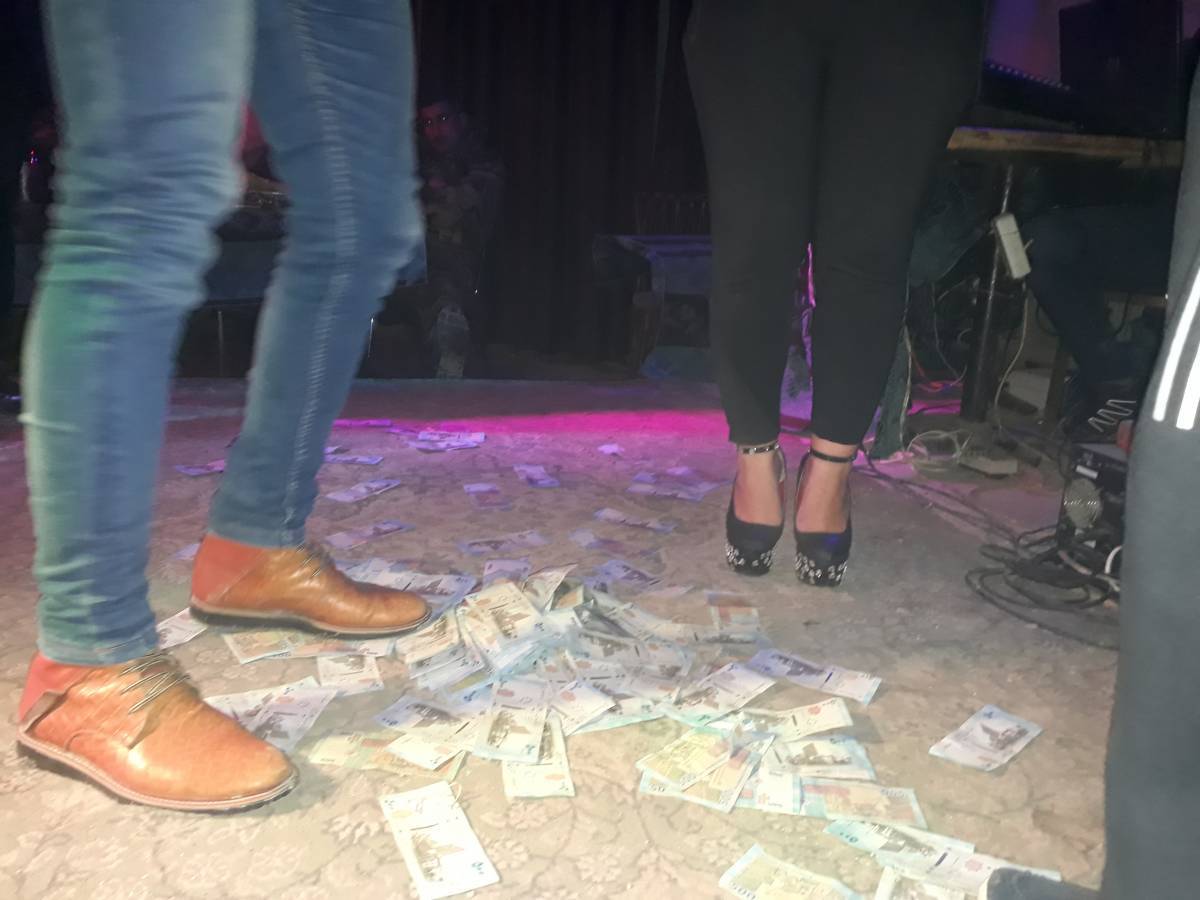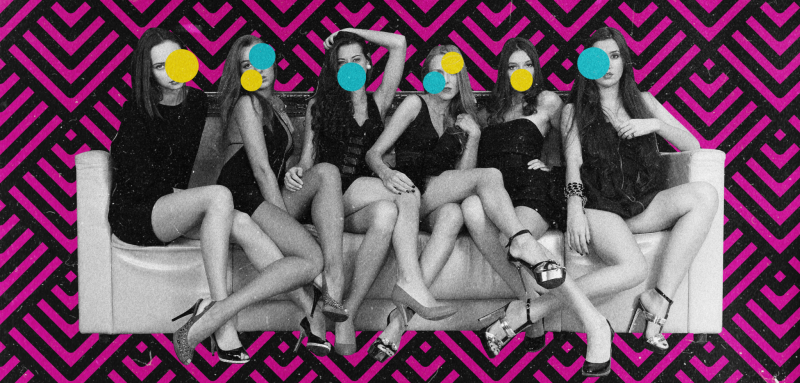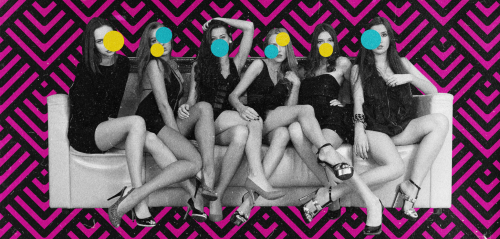I asked my friend Bahaa to take me to a nightclub to see for myself a day in the life of the ‘table girls’ (or hostesses) in Damascus’ nightclubs. We visited one of those nightclubs and were the first to arrive there. The club was basically a hall of about one hundred square meters in size, with several tables that accommodate about 80 chairs in total. In one of its corners was a small theater with loud sound equipment, playing songs by popular singers such as Saria Al Sawas and Bahaa Al Youssef.
At the tables, in the hall lit by dim lights that do not allow much illumination for one to easily distinguish their features, were girls in revealing clothing that show their thighs and some cleavage, noticeably wearing excessive makeup.
This is just one of the many cabarets spread throughout the center of Damascus, including but not limited to ‘Volume’ on May 29th Street, ‘The Wild Horse’ near Parliament headquarters, ‘Al-Maasa’ (the Diamond), ‘Al-Jawhara’ (the Jewel), ‘Semiramis’ in the Al-Salihiya neighborhood, and ‘Karawan’ in Hijaz Square. Others located in the areas of Al-Rabwah and Dummar include ‘Al-Shaderwan’, ‘Ishbilia (or Seville)’, ‘Burj Al-Ahlam’ (Bridge Of Dreams), and ‘Layali Al Shaderwan’ as well as within the suburbs of Maaraba and on the outskirts of Tel Mneen.
There were about 30 clubs in Jaramana, but they were closed down with the closure of tourist establishments due to the outbreak of the Coronavirus, and they have not yet been allowed to reopen.
Bahaa had brought alcoholic drinks with him. “I do not advise anyone to drink what is served in these places. Once I drank from the venue’s drinks and became immediately drunk from the second cup,” he says, referring to them as places that sell tampered and adulterated alcoholic drinks to their customers.
As the clock approached midnight, customers began flocking to the place until the tables were nearly full. I noticed a young man holding a laser light in his hand and responding to customers' requests. The customer points to a girl and the young man points the laser light on her so that the customer can confirm she is the one he is referring to. He then asks her to go to the customer’s table, which she immediately does.
Special Hostesses
It soon becomes quite clear that there is some type of former acquaintance between some of the customers and girls. The girl kisses the customer on the cheek and sits where he points her to, near him or one of his guests at the table, and sometimes she sits in the middle between two customers. When I asked Bahaa about that, he explained to me, “My friend, these probably do not have enough money to get two girls to sit with them at the table, so they request one girl and make do.”
The customer could place his hand on the girl's shoulders or hug her and touch her thighs, but we never saw or witnessed a kiss on the lips. “Anything but that…. ” Bahaa explained. After about an hour, the girl can leave the table to return to her own, and then another customer requests her and she joins the new customer's table.
“The customer can ask for a girl either for a full evening or for one hour, and everything has its price,” Bahaa explains.
Dalaa’, Samar, Sahar & Many Other Names
We met her through an intermediary in a Damascus café. It was not easy to convince her to talk about her career to the press. When we offered to publish what she says on Raseef22 under a pseudonym, she laughed hard and said, “Dalaa’, Samar, Sahar, Nour, Nagham, Ghenwa …. All of them are my names, and with each customer I use a different name. As for my real name, no one knows it except for the owner of the club, and he knows that if he reveals it, he will never see my face again.”
“Our profession is based on disguise,” she says to explain why she uses so many pseudonyms, “Nobody should know our real names, not even the way we look. We enter the dressing room and leave it looking completely different from the way we do in our normal lives.”
As the clock approached midnight, the men began flocking in. A young man held a laser light, the customer points to a girl and the young man points the laser light on her so that the customer can confirm she is the one
She chose to talk to us with the name Dalaa’, and she seemed tense at first, but Bahaa, one of the club’s customers who introduced us to her and is a previous acquaintance of hers, reassured her with some words he whispered in her ear. She then begins, “I am 27 years old and have been working here for nearly 10 years. I am in the club from 11 at night to 5 in the morning. I must respond to the invitation of any customer that requests me to sit with him, entertain him, and drink alcohol with him.”
She adds, “Sometimes, the customer is generous and gives me a ‘tip’, and sometimes he is ‘cheap’ so he does not order my favorite drink for me. Instead, he forces me to drink from his own drink, which is often ‘Arak’”.
In her line of work, it isn’t really a rare thing to be touched or caressed by a customer. She says, “Let’s be honest, the customer is looking to have a good time, and must leave happy and satisfied so that he will return again.”
She no longer feels disturbed or offended when a customer touches her. “We got used to it. It has become more than the norm.”
“My father is dead, and my sister is two years younger than me and works with me. My mother knows about this, and our relationship with my uncles from both sides of the family has been cut off for a long time now. We do not know anything about them, and they know nothing about us,” she says.
With a sad look on her face, she continues, “‘Table girls’ come in all shapes and sizes. Among them, you will find the one whose husband sends her to work. You will find the one who has lost her entire family, and you will find the one who fled her home beaten and abused.”
The ‘Shoutouts’ Singer
An organ was placed on the stage, and an unknown singer walked out and began singing the latest popular suggestive songs, such as “Sha’rata Wlo” and “Tee Rashrash” ... Any customer can stop the singer from his singing to request a ‘shoutout’ to whoever he wants from the attendees, on the condition he pays an amount of money. This is done through throwing the money onto the small stage and a boy comes out to collect it.

Some girls were lucky and received plenty of shoutouts. The shoutout is done by saying phrases such as “[shoutout] to the eyes of the prettiest...” or “God and…” or “[shoutout] to… and his guests”. The amount of money that was thrown on stage for the shoutouts was very large, and most of it consisted of the five-hundred-pound bills that do not bear any pictures of Presidents.
Regarding the fate of that money, which Bahaa called “nokta” (or tip), he explained that it is delivered to the administration of the place, and “every venue has its own system. In some venues, a cut is given to both the singer and the girls, while some venues do not give anything at all. It’s all according to their agreement.”
It Was Nicer Back in the Day
Abu Firas, a man in his 60s that lives in Damascus and owns a metalworking workshop, recounts how these cabarets were much more beautiful back in the day. “Performing groups used to come from all over the world and perform artistic and elegant performances.”
Abu Firas goes on to explain to Raseef22 how the quality and standard began to decline with the start of the nineties. “It became all about the women only,” he says, “We could ask one of the dancers to sit with us at the table and she used to be called an ‘Engejeyah’ girl, and the terms of her entry into the country prevented her from practicing prostitution.”
Our profession is based on disguise,” she says explaining why she uses so many pseudonyms, “Nobody should know our real names, not even the way we look. We enter the dressing room and leave it looking completely different from our normal looks.
The term ‘Engejeyah’, according to French translator and journalist Saeed Mahmoud, comes from the French word ‘Engagee’, and – as he explains to Raseef22 – it “takes on several meanings according to the way it’s used. It usually means engaged or taken, but in nightclubs it is used as a question: ‘Do you want to have intercourse?’”
Abu Firas continues, “Some clubs were able to preserve a little bit of something from the old times, but everything that is taking place now is just prostitution in disguise. The customers sit with the girl and ask for her number to call her the next day to engage in acts of prostitution,” adding, “That’s why I haven't gone back there in a long time.”
All these cabarets are licensed by the Ministry of Tourism, and the prices for entry are uniform – 10 thousand Syrian pounds per person (currently equivalent to three US dollars).
When a client requests a young woman to sit with him at his table, he must pay the venue an additional ten thousand pounds for one hour. He can request that she sits with him throughout the entire night for about 25 thousand pounds.
Some girls' work is only limited to sitting with customers in the nightclub, and some of them – if asked – agree to accompany them in order to engage in acts of prostitution. The cost of this isn’t specified and is usually left for the client and the girl to agree on. Each woman has her own rate, usually ranging from 20,000 to 30,000 pounds per hour, and from 50,000 to 100,000 for the whole night.
Prostitution Revisited
I asked Bahaa to call a young woman to the table, so she came and said that her name is ‘Layal’ and used phrases such as “my love”, “my dear”, “my darling” and “honey” to address us, but the noisy place and loud songs prevented us from having a proper conversation with her.
When we asked her to accompany us outside the club, she apologized for having prior engagements, but she gave us her number to agree on another day. The next day the number was constantly out of coverage, and after several days the number became out of service.
We called Mr. Yasser, an owner of a nightclub in the Rabwah area in Damascus, and told him that a girl from our acquaintances wanted to work in the club as a hostess, and he replied with, “Send her over immediately.” We asked him if she was required to accompany the customers outside the club, and he clarified, “No, not at all. It isn't required, but she is free to do so if she wants to. Actually, to me, the smart girl is the one that refuses to leave with anyone.”
When we questioned him regarding the pay, he stated, “She will receive ten thousand every day in the least, along with whatever she gets from the customer.” He then added, “But if no one asks for her, I will have to let her go.”
Ahmed Alaeddine, a Palestinian poet residing in Damascus who accompanied us to the nightclub, described his feelings after the visit ended with the words, “I felt very disgusted and what I saw brought back to my mind’s eye what we used to read about the olden slave markets."
“What do they get in return for all this money they waste? In all honesty, prostitution in all its ugliness and vulgarity is more honorable to me than what is happening here,” comments Alaeddine.
For his part, activist Firas Saeed, a specialist in criminal law residing in Damascus, explains to Raseef22 that, "Working in nightclubs is regulated by laws that stipulate the complete non-violation of public morals and decency, also stipulating that the girls known as ‘artists’ in this world are not to engage in prostitution.”
He indicates that there are unlicensed nightclubs where their female workers are exploited for their need to work, for “nightclubs that are duly licensed and supervised by the Ministry of Tourism are actually very few in numbers.”
Raseef22 is a not for profit entity. Our focus is on quality journalism. Every contribution to the NasRaseef membership goes directly towards journalism production. We stand independent, not accepting corporate sponsorships, sponsored content or political funding.
Support our mission to keep Raseef22 available to all readers by clicking here!
Interested in writing with us? Check our pitch process here!






